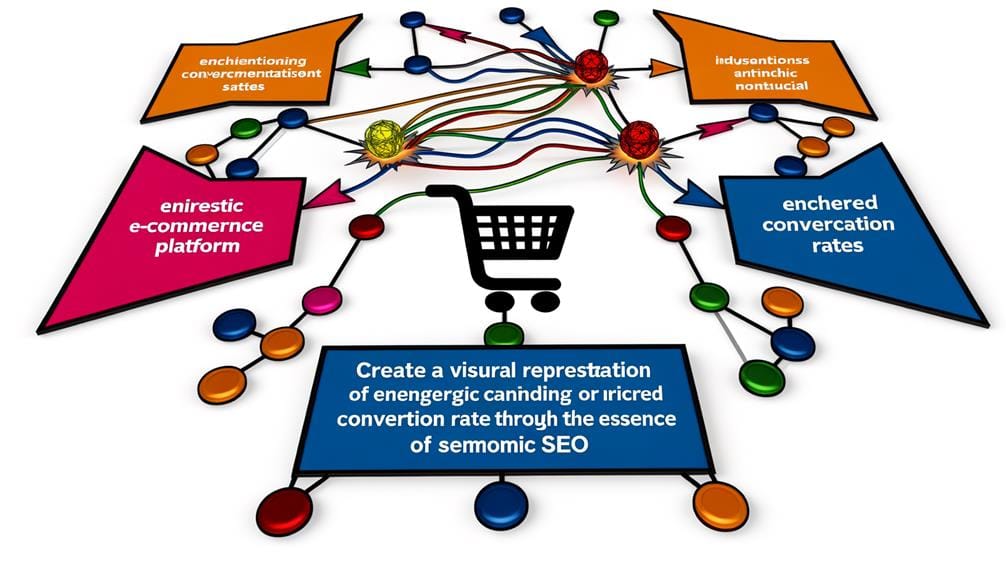Semantic SEO is crucial in e-commerce strategies because it aligns product pages with user intent, boosting search visibility and click-through rates. By using natural language and structured data, you enhance search engine understanding, leading to higher search rankings. This approach also improves user experience through relevant and tailored search results, reducing bounce rates and increasing time on site. Leveraging rich snippets attracts ready-to-buy customers, driving higher conversion rates and fostering customer loyalty. Semantic SEO also establishes your authority, improving brand recognition and trust. Explore how these tactics can elevate your e-commerce performance.
Key Takeaways
- Enhances search engine understanding of content through natural language and structured data.
- Aligns search results with user intent, improving engagement and user experience.
- Increases organic click-through rates and conversions by utilizing rich snippets.
- Boosts search rankings by targeting user queries and relevant keywords.
- Drives targeted traffic and improves visibility with contextually relevant content.
Understanding Semantic SEO
Understanding Semantic SEO means optimizing your content to align with user intent and meaning, ensuring search engines can deliver the most relevant results to your audience. By focusing on natural language, synonyms, and related keywords, you help search engines better understand the context and nuances of your content. This is crucial, especially in e-commerce, where aligning with user intent can significantly impact visibility and conversion rates.
Semantic SEO isn't just about keyword stuffing; it's about using structured data and schema markup to provide search engines with explicit information about your content. Structured data helps search engines comprehend the relationships between different entities on your site, leading to more accurate and relevant search results. By incorporating structured data, you can enhance your content's search engine performance, making it easier for users to find precisely what they need.
For instance, if you're running an online store, using structured data to clearly define product attributes, reviews, and availability can make your listings stand out in search results. This alignment with user intent not only improves search relevance but also boosts user engagement and conversion rates, making Semantic SEO an indispensable part of your e-commerce strategy.
Enhancing User Experience

Maximizing user experience in e-commerce through semantic SEO ensures that search results are precisely aligned with user intent, leading to higher engagement and conversion rates. By leveraging semantic SEO, you can enhance user experience by delivering more relevant and tailored search results. This approach focuses on understanding the meaning and intent behind search queries, ensuring that users find accurate and helpful information quickly.
Enhancing user experience with semantic SEO directly impacts key metrics such as bounce rates and time spent on site. When users find what they're looking for without frustration, they're more likely to stay on your site longer, explore more products, and ultimately, make purchases. This not only improves user satisfaction but also boosts your site's overall performance.
Furthermore, semantic SEO helps in aligning product information with user searches, driving higher engagement. Users appreciate when search results match their needs, which increases the likelihood of conversions. For example, if a user searches for 'eco-friendly running shoes,' semantic SEO ensures they get results showing the best options available, enhancing their shopping experience.
Aligning With Search Intent
Aligning with search intent means you need to understand user queries to enhance content relevance. By tailoring your product pages to match what customers are searching for, you can boost your search rankings and increase visibility.
This approach not only improves user experience but also leads to higher conversion rates.
Understanding User Queries
Grasping the nuances of user queries enables e-commerce sites to deliver precisely what shoppers are searching for, thereby enhancing search intent alignment and driving conversions. When you understand how users phrase their searches, you can tailor your content to meet their specific needs.
With Semantic SEO, you're not just targeting keywords but the intent behind those keywords. This means focusing on user queries that reflect the actual questions and problems your potential customers have.
By honing in on search intent, you can provide more accurate product recommendations and information. For instance, if a user searches for 'best running shoes for flat feet,' your site should offer content that addresses this specific need, from product listings to expert advice.
Data shows that aligning content with search intent can improve user experience significantly, as it ensures that visitors find exactly what they're looking for.
Semantic SEO enhances your e-commerce site's visibility by catering effectively to user search intent. This approach not only improves rankings but also increases the likelihood of conversions.
Prioritizing user queries in your SEO strategy is essential for staying competitive in the crowded e-commerce landscape.
Enhancing Content Relevance
Frequently, enhancing content relevance by aligning with search intent ensures your e-commerce site meets user needs, boosting visibility and conversion rates.
By focusing on search intent, you provide more targeted and valuable content, which directly impacts user engagement. When your content aligns with what users are searching for, it increases the likelihood of appearing in featured snippets and other prominent search results, driving more organic traffic to your site.
Data shows that e-commerce sites prioritizing content relevance through semantic SEO see higher click-through rates. This is because well-aligned content resonates with users, meeting their specific needs and queries. Consequently, your users are more likely to stay on your site longer, explore more products, and, ultimately, make a purchase.
Moreover, by addressing search intent, you create a user-centric experience that builds trust and loyalty. This approach not only improves user engagement but also significantly enhances conversion rates.
In the competitive e-commerce landscape, aligning your content with search intent isn't just beneficial—it's essential for maintaining profitability and long-term success. Improving content relevance through semantic SEO is a data-driven strategy that positions your site as a valuable resource in the eyes of both users and search engines.
Boosting Search Rankings
Regularly optimizing your e-commerce content to align with user search intent is crucial for boosting search rankings and driving organic traffic. By implementing semantic SEO practices, you can ensure your product pages meet the specific needs of users, making them more likely to appear in relevant search results. This not only enhances visibility but also improves conversion rates by addressing the queries that matter most to your audience.
Understanding and addressing search intent allows you to target long-tail keywords and niche queries more effectively. This strategy not only boosts your search rankings but also attracts highly targeted traffic, increasing the likelihood of sales. Semantic SEO practices help you create content that is contextually relevant, ensuring that search engines recognize your site as a valuable resource for specific topics.
| Benefits | Emotional Impact | Outcome |
|---|---|---|
| Higher visibility | Excitement | Increased traffic |
| Targeted traffic | Optimism | Higher conversion rates |
| Relevant content | Satisfaction | Improved user experience |
Boosting Search Rankings

To boost your e-commerce search rankings, prioritize enhanced keyword relevance and rich snippets utilization. By focusing on natural language and related keywords, you can improve your site's visibility and attract more organic traffic.
Additionally, using rich snippets can increase click-through rates, making your products more appealing to potential customers.
Enhanced Keyword Relevance
Semantic SEO significantly boosts search rankings by ensuring e-commerce sites target keywords that align precisely with user intent. By focusing on keyword relevance, semantic SEO helps your site rank higher for terms that are contextually relevant to your products or services. This approach doesn't just enhance your visibility in search results; it also drives organic traffic to your site, which is crucial for increasing potential sales.
When you leverage semantic SEO, you match user queries more effectively with your product offerings. This precise alignment leads to higher click-through rates and conversions. For instance, if you sell running shoes, semantic SEO ensures you rank not just for "running shoes" but also for related terms like "best shoes for marathon," capturing a broader audience with high purchase intent.
Moreover, semantic SEO contributes to creating a more personalized and relevant online shopping experience. This user-centric strategy drives engagement and fosters customer loyalty. By understanding the meaning behind keywords, you can provide content and product recommendations that meet user needs more accurately, enhancing overall satisfaction and boosting your search rankings even further.
Rich Snippets Utilization
Building on the relevance of targeted keywords, utilizing rich snippets like product prices and reviews can further boost your e-commerce site's search rankings and attract more qualified traffic. Rich snippets provide users with quick, relevant information directly on the search results page, which can increase click-through rates by up to 30%.
By incorporating structured data, you enhance your site's search visibility, making it more likely to appear in relevant searches.
Here are three ways rich snippets can benefit your e-commerce strategy:
- Higher Organic Click-Through Rate: Websites with rich snippets tend to have a higher organic click-through rate compared to those without, as users are more likely to click on results that provide immediate value.
- Improved User Experience: Rich snippets enhance the user experience by offering essential information upfront, such as product prices and reviews, which helps users make informed decisions faster.
- Increased Conversions: By attracting more qualified traffic, rich snippets can drive more conversions. When potential customers see detailed, relevant information in search results, they're more likely to visit your site and complete a purchase.
Implementing rich snippets with structured data is a powerful tactic to boost your e-commerce search visibility and drive success.
Improving Conversion Rates

Enhancing conversion rates in e-commerce hinges on aligning product descriptions and content with user intent through effective semantic SEO strategies. By optimizing for semantic search, you can ensure that your product descriptions are not only relevant but also tailored to meet the specific needs and queries of potential buyers. This alignment leads to a more personalized shopping experience, increasing the likelihood of conversion.
| Strategy | Benefit | Outcome |
|---|---|---|
| Product Descriptions | Matches user queries | Higher conversion rates |
| Natural Language Processing | Understands user intent | Improved user engagement |
| Structured Data | Enhances visibility | Better product discoverability |
| Long-tail Keywords | Attracts ready-to-buy users | Increased sales |
Utilizing techniques like natural language processing and structured data can significantly improve the visibility of your product pages. This means higher chances of your products being discovered by users ready to make a purchase. When your content aligns with user intent, you're not just attracting visitors; you're engaging potential buyers who are more likely to convert.
Implementing semantic SEO in your e-commerce strategy is essential for boosting conversion rates. Better product discoverability and enhanced user engagement directly translate to increased sales. By focusing on user intent and providing highly relevant content, you create a seamless and personalized shopping experience that drives conversions.
Establishing Authority

As you enhance conversion rates through semantic SEO, it's equally important to establish authority by creating high-quality, authoritative content that effectively addresses user queries. By focusing on a robust semantic SEO strategy, e-commerce websites can demonstrate their expertise in their niche, building trust with both users and search engines.
Establishing authority through semantic SEO can lead to several significant benefits:
- Higher search engine rankings: Search engines prioritize authoritative content, meaning your site is more likely to appear at the top of search results.
- Increased organic traffic: High-quality content draws users in, resulting in more visitors to your site without the need for paid advertising.
- Improved brand recognition: Consistently providing valuable information helps position your e-commerce site as an industry leader, fostering a loyal customer base.
E-commerce websites that prioritize semantic relevance stand out from competitors by offering content that resonates with their target audience. This not only boosts your visibility but also establishes your site as a trusted resource. By investing in a semantic SEO strategy, you're positioning your business to achieve long-term success through increased authority and user trust.
Implementing Semantic Strategies

To effectively implement semantic strategies in e-commerce, start by optimizing your product descriptions and metadata to align with user intent and search context. By doing so, you'll make sure that search engines understand your product information better, which improves your site's visibility and relevance. Utilize schema markup to include detailed product information such as price, availability, and reviews. This helps search engines like Google to better index your pages and present them more accurately to users.
Semantic strategies also involve using natural language and related keywords. This means your descriptions should reflect how real users search for products. Instead of generic terms, use specific and contextually relevant phrases that align with user intent. For instance, if you sell running shoes, incorporate keywords like "best running shoes for flat feet" or "affordable running shoes for beginners."
The benefits of implementing semantic strategies in e-commerce are clear:
| Benefit | Emotional Impact |
|---|---|
| Improved Search Rankings | Users find what they need faster |
| Higher Conversion Rates | More accurate results lead to more purchases |
| Increased User Engagement | Enhanced user satisfaction and loyalty |
Frequently Asked Questions
Why Is Semantic SEO Important?
Semantic SEO's important because it aligns with user intent and search intent. By using topic modeling, you provide more accurate, relevant results, boosting traffic and engagement. This approach enhances user experience and increases visibility.
Why Is SEO Important in E Commerce?
Ironically, without SEO, your e-commerce site might as well be invisible. It's crucial for traffic generation, online visibility, and customer retention. You can't afford to ignore SEO when 93% of online experiences start with a search engine.
Why Is Semantic Search Important?
You need semantic search because it understands user intent, considers search context, and analyzes keyword relationships. This leads to more accurate search results, enhancing user experience and driving higher engagement on your e-commerce site.
What Is Semantic Structure in Seo?
Think of semantic structure in SEO like a treasure map. You use latent semantics, a knowledge graph, and contextual relevance to guide search engines to your content. This boosts your rankings, relevance, and user satisfaction.
Conclusion
To wrap things up, did you know that websites using semantic SEO can see a 20% increase in organic traffic?
By focusing on user intent, enhancing their experience, and improving search rankings, you're not just optimizing your site; you're driving conversions and establishing authority.
Implement these strategies to stay ahead in the competitive e-commerce landscape.
Remember, it's all about connecting with your audience and meeting their needs effectively.

